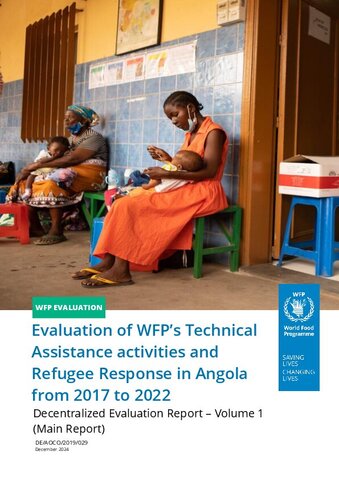
The evaluation covered the activities of country capacity strengthening and refugees: 1) technical assistance to the Government of Angola (GoA); 2) emergency response in drought-affected regions; and 3) refugee support. The evaluation was intended for both accountability and learning purposes. The overarching questions that guided the evaluation concentrated on the coherence, relevance, effectiveness, efficiency, impact, and sustainability of the various technical and humanitarian assistance approaches used by WFP. The evaluation also examined targeting within the current Interim Country Strategic Plan (ICSP) for the period 2020 – 2022. Additionally, it sought to identify successes, shortcomings, lessons learned, and areas for improvement to inform the design of the next Country Strategic Plan (CSP).
Key evaluation findings included:
- WFP’s TA efforts aligned strongly with the Government’s priorities in food security and nutrition, receiving positive stakeholder feedback and significantly improving food security management in targeted provinces through targeted training and partnerships, exemplified by the joint development of the National Strategy for Food and Nutritional Security (ENSAN II). However, key policies such as the ENSAN II and tools like the Integrated Food Security Phase Classification, require formal adoption.
- National capacity was bolstered through extensive training for GoA personnel on food security management.
- WFP effectively addressed the needs of vulnerable groups in Angola through tailored food security interventions and adaptive strategies, achieving significant results despite challenges in fully meeting the populations’ evolving needs.
- WFP’s food security interventions effectively integrated gender equality and women’s empowerment, significantly increasing women’s decision-making participation and roles within households, particularly in refugee contexts, while highlighting the need for continued gender-sensitive strategies and robust policy support.
- The sustainability of programmes is challenged by dependency on external support.
- Adequate financial and logistical resources are critical for food delivery and CBT.
Key recommendations from the evaluation included:
- Intensify advocacy and policy efforts by continuously engaging with relevant GoA ministries and institutions and accelerate the ratification process.
- Enhance local training programmes by identifying current gaps and developing targeted training modules for practical use.
- Facilitate workshops and forums with key stakeholders to promote the integration of WFP initiatives into national frameworks.
- Increase investment in resilience-building activities, focusing on agricultural and livelihood development through training programmes.
- Secure long-term donor funding and increase GoA financial involvement.
- Implement targeted interventions for households headed by women.
